It’s December, beginning of engagement season. So if you’ve already gotten a ring, or hoping to get one this month, there’s just one thing left to do after you’re told your loved ones and friends, and posted your bling on Facebook and Instagram. No, not start planning your wedding — start planning your marriage.
First stop: your indie bookstore or fave online bookstore.
In my research for The New I Do: Reshaping Marriage for Skeptics, Realists and Rebels, for this blog and freelance writing elsewhere, I have read a lot of books on love, sex, relationships and marriage. Some were pretty good, some were not so good, some were so good that I believe everyone about to tie the knot would greatly benefit from them.
This is by no means an exhaustive list, but here are five relatively recent books that are good reads with outside-the-box thinking, in no particular order:
Rewriting the Rules 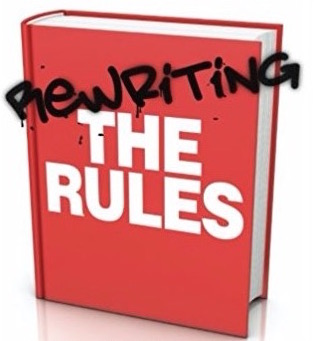
I’m not sure how I stumbled upon Meg-John Barker’s Rewriting the Rules, but I’m so glad I did. Barker, a lecturer in psychology at the Open University, who writes extensively about sex, gender and relationships, takes on the many “rules” we hear about love, dating and marriage — that there’s a soul mate or “the one” for us, that relationships must be monogamous and sexual lifelong, etc. What she gets more than any other book I’ve read is that most people today are living in a state of uncertainty about relationships and so we seek to take comfort in old rules or create new ones. But Barker suggests we might want to not only question these rules — some may be holding us back, making us unhappy or even ruining our relationships — but perhaps even rewrite them, thus creating a more authentic way of living. As she writes, “clinging to the common rules too rigidly, often paradoxically, ends up with us being less likely to get what we were aiming for in the first place.”
How to Fall in Love With Anyone
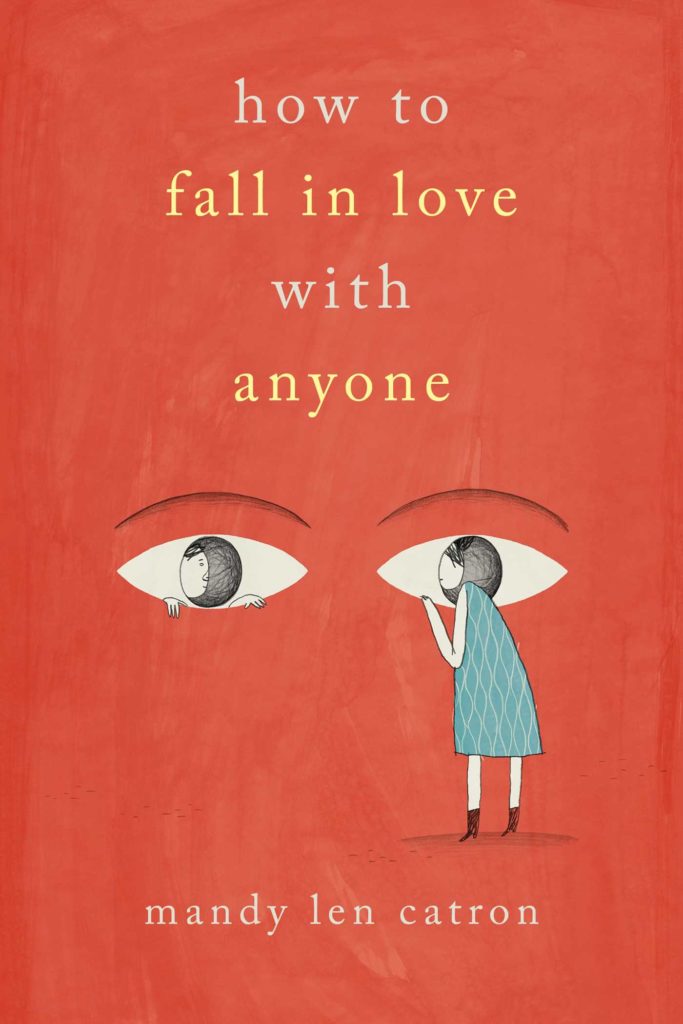 It’s no surprise that Many Len Catron’s Modern Love essay went viral and led to her getting her first book published this year, How to Fall in Love With Anyone. With charm and solid writing, Catron mixes her personal story of love and marriage with research to tackle the messages we get about love and relationships, and the scrips we follow (not unlike Meg-John Barker’s “rules”). Many of our love stories are problematic, and often set us up to have unreasonable expectations. If we are going to continue to look to love stories to inform us, she says, well, we’d better have access to better, more expansive and more diverse love stories. As she writes, “I wonder what the world would be like if we all consumed more nuanced, diverse stories of love. Maybe we would stop thinking about love as something that happens to us, and start thinking about it as something we get to offer another person, thoughtfully and with generosity. Or maybe we’d just have more interesting stories about what it means to be human.” This book will help you sort out the romantic scripts you may be following and, hopefully, get you to create your own.
It’s no surprise that Many Len Catron’s Modern Love essay went viral and led to her getting her first book published this year, How to Fall in Love With Anyone. With charm and solid writing, Catron mixes her personal story of love and marriage with research to tackle the messages we get about love and relationships, and the scrips we follow (not unlike Meg-John Barker’s “rules”). Many of our love stories are problematic, and often set us up to have unreasonable expectations. If we are going to continue to look to love stories to inform us, she says, well, we’d better have access to better, more expansive and more diverse love stories. As she writes, “I wonder what the world would be like if we all consumed more nuanced, diverse stories of love. Maybe we would stop thinking about love as something that happens to us, and start thinking about it as something we get to offer another person, thoughtfully and with generosity. Or maybe we’d just have more interesting stories about what it means to be human.” This book will help you sort out the romantic scripts you may be following and, hopefully, get you to create your own.
The All-or-Nothing Marriage 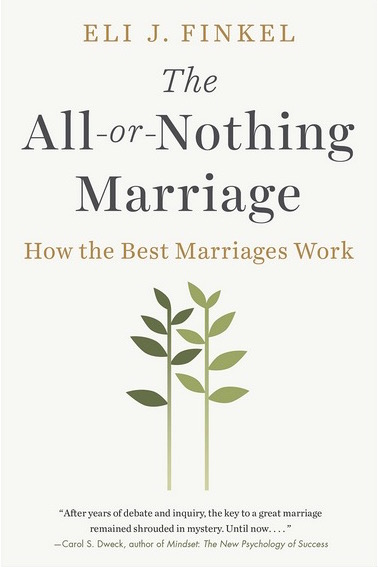
Should your spouse be your everything and fulfill all your needs — be your best friend; passionate lover; devoted parent; soul mate; great communicator; romantic, and intellectual and professional equal who provides you with happiness, fulfillment, financial stability, intimacy, social status, fidelity … etc.? Perhaps not, writes Eli J. Finkel in his new book, The All-Or-Nothing Marriage: How the Best Marriages Work. Finkel, a social psychologist, offers “love hacks” to address the niggling issues that often arise in marriages, as well as strategies that couples can use to better their relationship, like looking to have some needs met outside the marriage. And, he references The New I Do — thank you! — by embracing the idea of asking less of our marriage and re-envisioning new ways to make it work, like living apart together. Lots of thought-provoking, practical and doable suggestions.
Parenting as Partners
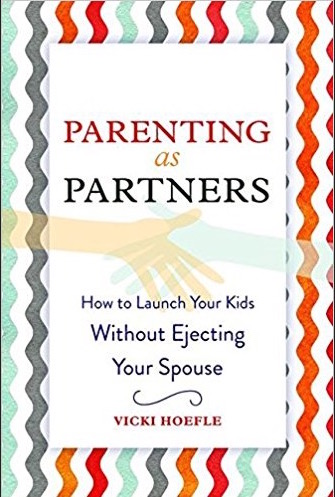 It may seem to early to think about kids when you’d rather think about picking out a dress and the perfect wedding venue, but if you’re planning to have children, it’s essential to understand your family-of-origin issues. It’s never too soon. Parenting coach and author Vicki Hoefle’s new book, Parenting as Partners: How to Launch Your Kids Without Ejecting Your Spouse, brings that conversation into the forefront. Her book is designed to help couples create a parenting plan — just as we suggest in The New I Do — to help them get on the same page about their children and to understand what drives our behavior, and our partner’s behavior, when it comes to the childhood we want to give our children. If they don’t agree, she writes, “parents grow further and further apart, until they are either sabotaging each other openly or have entered into a quiet battle of wills, otherwise known as a power struggle. Without a course correction, not only are the children impacted in a negative way; the marriage suffers enough that parents consider divorce their only remedy for an untenable situation.” Yep.
It may seem to early to think about kids when you’d rather think about picking out a dress and the perfect wedding venue, but if you’re planning to have children, it’s essential to understand your family-of-origin issues. It’s never too soon. Parenting coach and author Vicki Hoefle’s new book, Parenting as Partners: How to Launch Your Kids Without Ejecting Your Spouse, brings that conversation into the forefront. Her book is designed to help couples create a parenting plan — just as we suggest in The New I Do — to help them get on the same page about their children and to understand what drives our behavior, and our partner’s behavior, when it comes to the childhood we want to give our children. If they don’t agree, she writes, “parents grow further and further apart, until they are either sabotaging each other openly or have entered into a quiet battle of wills, otherwise known as a power struggle. Without a course correction, not only are the children impacted in a negative way; the marriage suffers enough that parents consider divorce their only remedy for an untenable situation.” Yep.
The Rough Patch 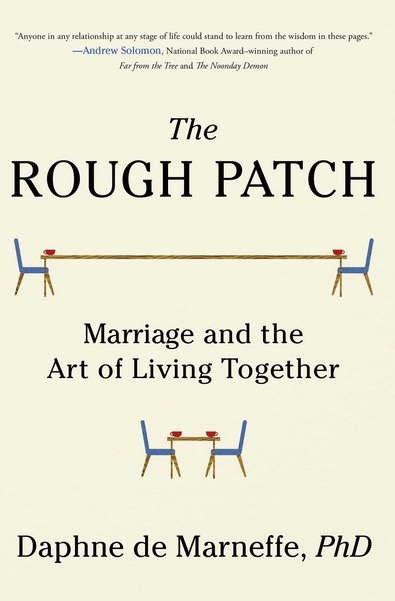
Wait — you haven’t even tied the knot yet; why would you want to read a book about midlife marital angst? Because it’s a thing, and if you want to avoid it — or at least lessen it — it might be helpful to know how you might get there in the first place. There’s a lot of wisdom in therapist Daphne de Marneffe‘s upcoming book The Rough Patch: Marriage and the Art of Living Together. “Couples turn away from each other for any number of apparent reasons, but underneath it all, it’s usually because they feel misunderstood, unheard, or unable to agree,” she writes, but it takes many years to get to the crisis stage, starting from your first days together. She has some sound, if not necessarily unique, approaches to dealing with affairs, sexual attraction to and flirtations with others. “The question is, how do we deal creatively and sensitively with the daily reality of encountering other sexual bodies, other sexual minds, when we have chosen to commit ourselves to one other person? This is arguably among the more important life skills for remaining happily married, yet it attracts little in the way of subtle reflection or serious study.” True! I particularly like the way she addresses booze, drugs and other “attempted escapes.” Most of us have a family history or story related to that; we could all benefit by digging a little deeper into it.
Of course, my fave book for all spouses-to-be is my own, The New I Do: Reshaping Marriage for Skeptics, Realists and Rebels, which was just named by Business Insider one of best five books to help you think differently about love, marriage and relationships (Thanks!). You can support your local indie bookstore or order it on Amazon.

















The obvious solution is not get married or into an exclusive relationship. Then you don’t have to worry about all the nonsense that comes along with it. Marriage is a legal contract with no significant advantage for men and it is supported by a legal system woefully hostile to men. No thanks.
Twitter: OMGchronicles
says:
Study after study proves that marriage is VERY good for men, not for women. Divorce isn’t good for men. Please don’t confuse the two …
Not confusing the two, dear. You can find studies by feminists to support anything you want but how about you apply a little common sense here for a change? If marriage is so great for men then why are you women always begging, nagging, and threatening us for “commitment”? Fortunately many of us guys have wised up and just say no to marriage. I have to say that I am the envy of my single male friends, and with very good reason.
Since women can run off at any time for any reason and take half of a man’s assets and since half or more of marriages end in divorce (usually initiated by women) then a man would have to be a fool to marry a woman, especially an American feminist.
Again I issue the challenge that you and your sycophants can’t seem to address: What can I have by being married that I can’t have by being single? Of course you know the answer to that one by now, don’t you? 😉
Twitter: OMGchronicles
says:
https://www.sciencedaily.com/releases/2017/02/170207135943.htm: “research shows there is a “marriage premium” for men that includes:
• A financial return that includes higher earnings, more assets and more job stability. Married men make about $16,000 more than their single peers with otherwise similar backgrounds.
• Better sex lives compared to both single and cohabiting men. According to data from the National Health and Social Life Survey, 51 percent of married men reported they were extremely emotionally satisfied with sex, compared to 39 percent of cohabiting men and 36 percent of single men.
• Longer lives. Men who get and stay married live almost 10 years longer than their unmarried peers. Also, young married men are about twice as happy: 43 percent of married men report they are “very happy” with life, compared to 20 percent of single men and 24 percent of cohabiting men.”
Also
http://time.com/money/4116161/alimony-reform-spousal-support/: “Unlike child support, which is common when divorcing couple has kids, alimony awards have always been very rare, going from about 25% of cases in the 1960s to about 10% today, said Judith McMullen, a professor of law at Marquette University. In one study of Wisconsin cases, she found it was only 8.6%.”
You don’t know what you’re talking about. But, it’s great that you don’t want to marry. I don’t think you or anyone “should.” Some men and some women might want to no matter what you think or say. I’m here to help them realize what they’re doing.
Have fun banging the babes you claim to be able to be able to bang. Not everyone wants that lifestyle either.
This is hilarious and you are clueless. Especially the “Better sex lives compared to both single and cohabiting men” part. If I had a dime for every married man I know who has to beg his wife for sex I would be a rich guy. My married buddies are green with envy when they see the young hotties I hang out with. Now that I am single after being married for 30+ years I am having the best sex of my life, by far. Women aim to please if they don’t have you tied down whereas married women have you over a barrel and control your sex life. Now I can have sex with all the young hotties I want and it is great! I don’t have to deal with with entitled, saggy 50+ y/o post-menopausal feminist hags who can’t hold a candle to the younger ladies.
Alimony is only paid by those who have money. That’s why it is often not included in divorce settlements. If you are a well-off guy like me you have to pay through the nose if you get divorced. Women make 40% of the money but men pay 97% of the alimony. Ridiculous and unfair to say the least. All the more reason for a guy not to get married.
By the way, I kept my marriage vows. Apparently you did not. You are at least twice divorced plus there is a history of adultery on your part if I remember right. Oh, and let me guess, you got financial support when you ditched your poor cuckolded exes right? So don’t preach to me.
Oh, almost forgot to shoot down another your other delusional myth regarding marriage:
“The association between marital history at midlife (in 1950) and mortality (as of 1991) was studied in a group of intelligent, educated men and women (N = 1,077) who participated in the Terman Life-Cycle Study initiated by Lewis Terman in 1921. Results confirm that consistently married people live longer than those who have experienced marital breakup but suggest that this is not necessarily due to the protective effects of marriage itself. Individuals who were currently married, but had previously experienced a divorce, were at significantly higher mortality risk compared with consistently married individuals. Furthermore, individuals who had not married by midlife were not at higher mortality risk compared with consistently married individuals.”
So a single man who avoids marriage like the plague will have as long or longer (if ever divorced) lifespan than married men. Haha!